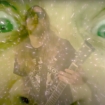For over ten years, prolific Savannah, Georgia trio Black Tusk played insistent, immediate music that, despite its frequently rapid tempos and punk-ish vocals, was widely referred to as "swamp metal" due to its muddy distortion and repetitive riffs. Embracing the title, they continued to tour relentlessly, played Metallica's Orion Fest and released aggressive and combustive albums, EPs and split releases with their friends in The Holy Mountain, Dead Yet? And Fight Amp.
Then, on November 9, 2014, about a month after Black Tusk finished recording their fourth full-length Pillars of Ash bassist and vocalist Jonathan Athon was killed from injuries sustained in a motorcycle accident. He was riding his Harley Davidson with his girlfriend at around 9:30 p.m. when an elderly woman ran a stop sign and hit his bike.
Athon's death resonated through the metal community, but, perhaps, no one was more affected by than bandmate and closest friend, guitarist and vocalist Andrew Fidler who questioned whether he wanted to play in the band without Athon. "After getting over the initial shock of what had happened, you turn to each other and go, 'Well, is this it or will we carry on and do something else?'" he says the day before leaving for a headlining North American tour. "We all really talked and we realized that Black Tusk is bigger than just the three of us. We've all dedicated the entirety of our twenties to the band. Why not continue with the hard work and carry it forward?"
Delaying the pain of working on new songs without Athon, Black Tusk recruited ex-Kylesa bassist Corey Barhorst. Pillars of Ash was finally released on January 29, 2016, and the band toured to support the release. The next year, when they finally sat down and started to work on new songs with Barhorst they decided to shift direction and focus more on their punk rock influences. The result of their efforts, T.C.B.T. is raw and abrasive, loaded with unmuted guitar riffs, D-beats and a combination of barked and screamed vocals from all three band members.
"When we discussed the thematic ideas for the record and what we wanted to write, we all decided we wanted to make an angry album with a lot of punk songs influenced by groups like Black Flag," Fidler says. That's the kind of stuff we were into when we were kids."
The primal rage and intensity of T.C.B.T. was inspired in part by Athon's death, but also by the illness and loss of other friends and loved ones and the determination to do exactly what they felt like doing, knowing how fragile and transitory life can be. During a revealing conversation, Fidler addressed the tragedies he has been stricken by during the past couple years, the changes Barhorst brought to the band, the meaning of the album title and his firm conviction that no matter how bad things get there is always a ray of hope or a glimmer of beauty that can provide strength right when you feel like giving up.
WERE YOU TIRED OF BEING ASSOCIATED WITH "SWAMP METAL" OR DOOM OR WHATEVER PEOPLE HAVE CALLED YOU? WAS DOING T.C.B.T. A WAY OF SAYING, "FUCK YOU! WE CAN BE A PUNK BAND IF WE WANT?"
ANDREW FIDLER Honestly, it doesn't really matter to me personally what people call us. I like the swamp metal moniker. We write all the material together, so one-third of the sound is Corey's writing. This is his first record collaborating with us. And if you throw a new writer into the mix you're gonna wind up with a different kind of thing. He definitely writes more along that that punk-ish vein and James [May, drummer] and I were into that as well. It felt like it was just time to go for it on this record. We thought, Let's take it in a new direction and really let loose.
WAS IT AT ALL DIFFICULT TO WORK WITH COREY AFTER HAVING PLAYED WITH JONATHAN FOR EIGHT YEARS?
It was just a different type of collaboration. Corey's a different person, but the process of writing songs was the same. We wrote everything together and we had the benefit of having known each other for a long time. We've played with one another in tribute bands and stuff around town for, like, Halloween shows. So it's not like this is our first time playing with him. And we toured with Corey for a year or so after Pillars of Ash came out. So it was a fairly seamless transition from him joining the band, playing shows and then going right into writing.
DO YOU FEEL A LACK JONATHAN'S PRESENCE IN THE MUSIC OR THE BAND?
Honestly, it's kind of a different band. Corey's not trying to be Jonathan. We're not trying to copy what the band was because it'll never be that again.
IS IT EVER WEIRD TO LOOK ACROSS THE STAGE AND REALIZE JONATHAN'S NOT THERE?
For sure, sometimes. He was my best friend. You know, him being gone from something that we built together is hard. But Black Tusk is still our life and my life's passion. So in Corey, we've found a great friend and we've moved forward. We don't live Jonathan's death every day, we live with it. You get bummed out at times, but then you kind of just continue with whatever you need to do.
THE DEATH OF A CLOSE FRIEND OR A FAMILY MEMBER IS A TRAGEDY AND EVERYONE DEALS WITH GRIEF IN THEIR OWN WAY. BUT EVENTUALLY, YOU HAVE TO MOVE ON.
Right, you have to live. The world is still moving around you. All these things have been happening and you got to catch up and gotta jump back into what you want to do. It's really a case of sink or swim.
WAS WORKING ON T.C.B.T. THERAPEUTIC?
I mean, by the time we got into the working on that, I was dealing with a toddler. [Fidler's three-year-old son walks into the room]. "Hey, there he is! What are you doing up here, buddy? Can I take the diaper?" …Yeah, I'm sorry. Duty calls. Where were we? You know, life is really busy and sometimes I don't have time to work out stuff, so if something was bothering me I would take that and bring it to the rehearsal space and put it into a song somehow.
WERE THERE OTHER THINGS GOING ON IN YOUR LIFE OR THE WORLD THAT MOTIVATED YOU TO TAKE AN AGGRESSIVE APPROACH AND WRITE SONGS LIKE "ORANGE RED DEAD," "SCALPED" AND "WHISPERS"?
My wife has been sick for the last year with breast cancer and that's been really hard. And we lost two really good friends to cancer this year. So that makes you kind of angry. And then you know, there's a clown running our country. There's a lot of things to be angry about. At the same time, there's still hope and things to be happy about. I'd like to think a lot of the album as the balance between those two things.
IS YOUR WIFE DOING BETTER?
Yeah, she had her cancer diagnosis over a year ago and we spent last year doing all the chemos and surgery. That's one of the reasons when we worked on the record I was staying home. It was pretty … You know, she's just had radiation and she's doing oral chemo now, but the doctor… They won't tell you that there's remission. But they feel pretty confident. We're feeling pretty confident living with the new normal, right? All that medicine makes you feel pretty awful. But yeah, it's hell and we have a little toddler. But we gotta get on with living.

DID YOU WRITE ANYTHING ABOUT JONATHAN OR YOUR WIFE?
Not directly. But I wrote "Agali," which was about the death of our good friends [DAMAD's] Victoria Scalisi and Jake Trout, who passed away from cancer. The song is about losing your earthly body and rebirth, and then your spirit coming back and influencing those around you in the things that you've done in life that what will help them.
THAT'S A PRETTY POSITIVE WAY TO LOOK AT TRAGEDY. THERE'S A DUALITY IN THE LYRICS BETWEEN HOPE AND NIHILISM, WHICH IS INTERESTING GIVEN ALL YOU'VE BEEN THROUGH. ONE WOULD THINK IT COULD HAVE TOTALLY BEEN A "FUCK THE WORLD" KIND OF RECORD.
It totally could have been. And a lot of it is pretty nihilistic, but that's just life. There's a lot of suck and then there are rays of hope, right? That's what I try to touch on in my writing.
DO YOU FEEL LIKE THE EXPERIENCES YOU'VE BEEN THROUGH HAVE GIVEN YOU A DIFFERENT PERSPECTIVE ON WHAT YOU WANT TO DO WITH THE BAND OR IN LIFE?
I would think that I know what I want to do and how I want to play and what I want things to be like more than in the past. And that hearkens back to the name of the album, T.C.B.T., Take Care of Black Tusk. We're going to do our own thing and take care of ourselves.
IS THIS A MOTTO YOU CAME UP WITH RECENTLY?
We've had it for a long time and it's a takeoff of the Elvis phrase TCB, Taking Care of Business. We all got T.C.B.T. tattoos years and years ago when someone came up with it. I don't remember who. But if you dig in our Instagram, there's an old picture of the three of us showing off our tattoos. Now we just need a plane with that on the side of it like Elvis.
THE ARTWORK FOR T.C.B.T., WITH THE STENCILED LETTERS AND THE LIGHTNING BOLT, IS REMINISCENT OF ELVIS' TCB DESIGN.
It's actually a picture of the stencil design on our cases. We put that on all our gear many years ago when we came up with the slogan. And Brian Mercer put some artwork underneath it.
WHAT WAS THE GREATEST OBSTACLE YOU FACED WORKING ON THE ALBUM?
We did it at home because we had a lot of family business going on. In the past, we would go off somewhere and completely immerse ourselves in the record. This time around, life wouldn't let that happen so we spent a lot of months going in and doing sessions for it. But all the songs were written together. We didn't trade files back and forth or anything. And then it only took about a month to record them, track them or fine tune them. The plan with us is we want to have everything done when we go into the studio, so we aren't writing anything there and wasting time.
THE KEYBOARD PARTS ON T.C.B.T. ADD A NEW DIMENSION TO THE BAND.
That's Corey, man. He's a virtuoso. Corey has a lot of skills and when he came to the band he was like, "You guys know I can do all this stuff." I'm like, "Well, I think we should use it." I don't see why we can't incorporate that into the music in a way that makes it sound like Black Tusk and I think it totally worked out great. And now Corey's been putting together all our samples and intro stuff that we use in the live set.
WILL IT BE HARD TO PULL OFF THE SONGS ON T.C.B.T. LIVE AS A THREE-PIECE?
No, because we added a touring guitar player, our buddy Chris "Scary" Adams, who produced and engineered the album. And I'm sure he will be contributing to the next record now. Chris is a longtime collaborator and friend of the band and on the album we added all these layers and we don't want to leave them out so he came onboard.
THERE ARE SOME GREAT DRINKING STORIES ABOUT YOU GUYS IN THE PAST. DO YOU PARTY LESS THESE DAYS?
Oh, definitely. We did a decade of that and now we have family businesses and other obligations. We'll have a drink here and there, but we don't party like we used to, especially at home. I own a construction business that's doing well. We have three employees and we all split the profits. I think the real pay cuts to my income happen when I'm on tour!












